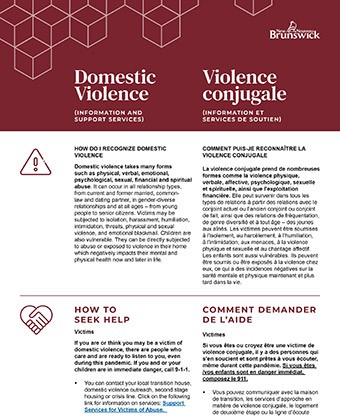HOW DO I RECOGNIZE DOMESTIC VIOLENCE
Domestic violence takes many forms such as physical, verbal, emotional, psychological, sexual, financial and spiritual abuse. It can occur in all relationship types, from current and former married, common-law and dating partner, in gender-diverse relationships and at all ages – from young people to senior citizens. Victims may be subjected to isolation, harassment, humiliation, intimidation, threats, physical and sexual violence, and emotional blackmail. Children are also vulnerable. They can be directly subjected to abuse or exposed to violence in their home which negatively impacts their mental and physical health now and later in life.







